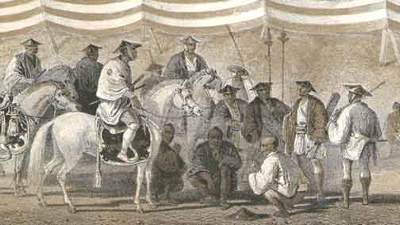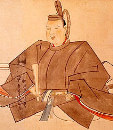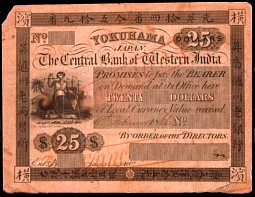|
The above banknote
was issued by the Central Bank of Western India at Yokohama, Japan.
It was printed in London by Batho Sprague and Company and has a handwritten date
of 9th
February 1866. The signature on the note was that of J. Morrison and the
design contains a vignette of a woman holding a balance scale, palm trees,
cotton bales, jewelry and a
backdrop of hills and sailing ships. The
note is cancelled with a rubber stamp.
A bank named BANK OF WESTERN INDIA, which
operated during the period of 1842-1845 A.D. was not related to this
issue.
The Central Bank of Western India was an important bank because it related
to
Japan, America and India. The high value of $25 was significant as it was
issued during a time of great turbulence in Japan.
During this period there were a number of attempts by western powers to establish relations with Japan. In 1852
the USA government decided to initiate trade relations with Japan and was
prepared to use force if negotiation failed. Commodore Matthew Perry was sent on a mission with three steam ships,
the Mississippi, Saratogo and Plymouth along with a flag ship named Susquehanna.
They sailed to Japan on 8th July 1853
entering Edo Bay they anchored at a distance of 1 kilometer from Uraga City but
the Japanese Shogun declined to meet the delegation of
commander Perry.
After threatening the Japanese government they landed with 300 men and
transmitted a
message from U.S. President Fillmore to the representatives of shogun.
establish relations with Japan. In 1852
the USA government decided to initiate trade relations with Japan and was
prepared to use force if negotiation failed. Commodore Matthew Perry was sent on a mission with three steam ships,
the Mississippi, Saratogo and Plymouth along with a flag ship named Susquehanna.
They sailed to Japan on 8th July 1853
entering Edo Bay they anchored at a distance of 1 kilometer from Uraga City but
the Japanese Shogun declined to meet the delegation of
commander Perry.
After threatening the Japanese government they landed with 300 men and
transmitted a
message from U.S. President Fillmore to the representatives of shogun.
It took more than 6 month of consideration by the Japanese government and Perry's treaty of friendship was signed
by Japan on March 31st of 1854,
opening Japanese ports for U.S. trade. Nagasaki and Hakodate were the
first ports used followed later by Yokohama. Yokohama became a main port
and transit p oint for goods into Japan, China and the other countries in the
region. oint for goods into Japan, China and the other countries in the
region.
During this period the British Crown cooperated with
the Americans as the Japanese started building their fleet after lifting a
ban for the construction of large ships. They purchased many ships guns
and arms from the Dutch to counter the American ships.
In this
new environment, traders from Western India sailed from the
ports of Surat and Bombay. Along with the U.S. traders they agreed to start a bank
at Yokohama, Japan under the name of THE CENTRAL BANK OF WESTERN INDIA
with a branch in Hong Kong. These notes
are known to have
circulated in Japan and China.
At this time most banknotes were issued by Commercial Banks rather than by a
Central Bank. Regulations for banknote issue in
nineteenth-century Japan and China were loosely controlled. The government
accepted payments for taxes and fees in banknotes only if from banks
incorporated by Royal Charter or under the Colonial Regulations. This
requirement did not prevent other banks from issuing notes, however, banknotes of denominations
below $5 were not allowed without special government
permission. This was to prevent banknotes getting into the hands of
poorer people, who would suffer more in the event of a bank collapse.
Three note issuing banks did, in fact, collapse in the nineteenth century,
the Agra and Masterman's Bank, the Commercial Bank Corporation of India
and the East during the global financial crisis of 1866, as well as the Oriental
Bank Corporation, one of the main note issuers in 1884.
CM We gratefully acknowledge
Changmus Mus who provided the above image
and background information.
CM We gratefully acknowledge Pablo Hoffman for the back image. |



![]()